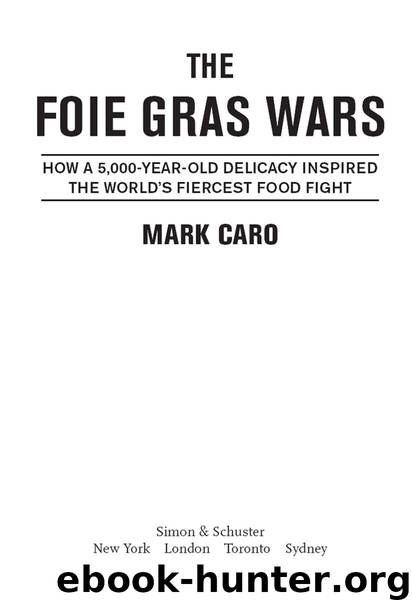The Foie Gras Wars by Mark Caro

Author:Mark Caro
Language: eng
Format: epub
Publisher: Simon and Schuster
Published: 2009-07-27T16:00:00+00:00
One of the most intriguing debates over the ethics of foie gras production took place in the Israeli Supreme Court. A coalition of Israeli animal-protection groups who adopted the name “Noah” petitioned the court to prohibit force-feeding in the production of foie gras. At stake was a robust agricultural industry in a small, largely arid country where farming successes aren’t taken for granted. The 2002 Noah petition sought to outlaw foie gras farming by applying Israel’s 1994 Protection of Animals Law, which states: “A person will not torture an animal, will not be cruel toward it, or abuse it in any way.” It also sought to nullify 2001 government regulations that specified how feedings be carried out and ordered that no new foie gras farms be established and no existing ones be expanded. Israeli foie gras production predominantly involved geese, not ducks, and, as mentioned before, geese were not kept in individual cages.
In August 2003 the Noah petition came before the three veteran Supreme Court justices who would decide its fate: Asher Grunis, Tova Strasberg-Cohen and Eliezer Rivlin. Their written opinions offered the kind of intellectual heft—and fodder for arguments—that legislatures in California and Chicago wouldn’t attempt to match.
Grunis’s lengthy opinion (29 pages in the court’s official English language translation) methodically analyzes the moral, legal, historical and religious issues at play. The prohibition on tza’ar ba’alei chayim (“cruelty to animals” in Hebrew) is rooted in Jewish religious law and cemented in Israeli civil law. The broader question, he writes, is how to balance the competing interests of humans and animals.
For all of his opinion’s breadth and detail, Grunis spends little time weighing whether force-feeding geese actually constitutes cruelty, instead yielding to the 1998 European Union report: “It seems, in light of the Scientific Committee’s statement, that force-feeding does cause suffering.” To Justice Grunis the real question was whether this suffering yields sufficient human benefits. In an earlier case, the Israeli Supreme Court ruled against a spectacle in which a man fought a crocodile; the decision was that the animal’s suffering was not justified by the end result: entertainment. “Clearly, in the hierarchical ranking of purposes, production of food for human consumption will rank above entertainment,” Grunis writes. A section of Israel’s anticruelty law even specifies that the minister of agriculture must consider “agricultural needs” when determining whether animals are being treated properly. “Agricultural needs,” Grunis notes, are not the same as “farmers’ interests”; they also cover food production, something that’s beneficial to the general public. “Force-feeding geese is an agricultural need. In this aspect it is no different than raising cows for milk or meat, than raising calves, or than raising hens for eggs or for poultry meat.” Of course, one of the key arguments against foie gras is that it is nonessential; no one views fatty goose liver as basic sustenance. The Noah filing even refers to foie gras as “gastronomic entertainment” in an effort to link this case to the crocodile one. But Grunis rejects such reasoning as leading to inevitable “hairsplitting distinctions” between so-called basic and luxury foods.
Download
This site does not store any files on its server. We only index and link to content provided by other sites. Please contact the content providers to delete copyright contents if any and email us, we'll remove relevant links or contents immediately.
Craft Beer for the Homebrewer by Michael Agnew(17475)
Marijuana Grower's Handbook by Ed Rosenthal(3143)
Barkskins by Annie Proulx(2896)
Project Animal Farm: An Accidental Journey into the Secret World of Farming and the Truth About Our Food by Sonia Faruqi(2675)
Red Famine: Stalin's War on Ukraine by Anne Applebaum(2482)
The Plant Messiah by Carlos Magdalena(2469)
Organic Mushroom Farming and Mycoremediation by Tradd Cotter(2318)
0041152001443424520 .pdf by Unknown(2241)
In the Woods by Tana French(2023)
Beer is proof God loves us by Charles W. Bamforth(1946)
The Art of Making Gelato by Morgan Morano(1909)
Meathooked by Marta Zaraska(1905)
Birds, Beasts and Relatives by Gerald Durrell(1880)
Reservoir 13 by Jon McGregor(1862)
The 7 Habits of Highly Effective People: Powerful Lessons in Personal Change (25th Anniversary Edition) by Covey Stephen R(1849)
Borders by unknow(1798)
The Lean Farm Guide to Growing Vegetables: More In-Depth Lean Techniques for Efficient Organic Production by Ben Hartman(1795)
The 7 Habits of Highly Effective People: Powerful Lessons in Personal Change by Stephen R. Covey(1778)
Urban Farming by Thomas Fox(1760)
